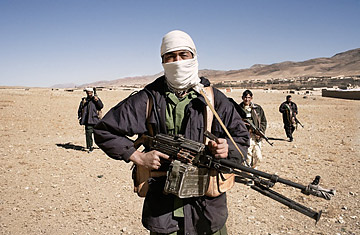By Eshaq Akrami & Aref Noori
While the process of disarming local commanders has stretched over six years little has changed on the ground in Kunduz, Ghazni and Bamyan.
Locals complain of harassment and extortion at the hands of armed gunmen - both individuals and members of the Afghan Local Police (ALP).
The men told him that if he wants to live in Waras he has to follow Wafa's orders or be killed.
In Khan Abad district, Kunduz, there are roughly 4,000 armed men. They force farmers to pay a toll during harvest time or threaten to kidnap or kill. Many of them have links to high-ranking government officials, locals say.
A resident who did not want to be identified told Radio Azadi things were so bad that people were thinking of leaving the district.
"Brother, these government authorities are supporting them. They forcibly collect oshr (a tenth of the yield) from farmers, shoes, clothes and money from shops for themselves and their family members," the anonymous caller said.
A shopkeeper in Khan Abad district was of the same view. He too did not want to be identified. "We have frequently complained about the intimidation to district authorities but no one has heard our voice," he said.
"Irresponsible" groups
Hayatullah Amiri, the district governor of Khan Abad, agrees to the presence of "irresponsible groups who are abusing people" but he claims they are also useful to the government. Armed groups have always been present but now some of them have turned to "harming people", according to Amiri.
He has appealed to the new president, Ashraf Ghani Ahmadzai, to find a legal way to disarm "irresponsible" individuals. "We have not been sitting around but we are trying to find ways to counter them, prevent them from harassing or looting people," he told Killid.
People in Waras district under Bamyan Police say a former commander, Sarhang Wafa, has announced his own "kingdom", and is harassing and beating people who live within its borders. Recently he nearly beat a farmer, Dawood Sharifi, to death, and warned that anyone who disobeys his orders would be severely punished. Sharifi told Killid that he recently returned from Iran in high hopes of making a better life, but fate has been cruel. "Four armed men barged into my house at 9 at night, dragged me out and broke every bone in my legs and arms," he wept as he talked.
The men told him that if he wants to live in Waras he has to follow Wafa's orders or be killed. "I have to live here or leave Waras to Wafa," he said.
State control
Uncle Rawoof, another resident, says Wafa mediates all disputes in the district. "No one has the right to take his case to the district governor's office," he says. The two parties must abide by Wafa's decision, and pay him between 20,000 and 30,000 Afs (350 to 525 USD) each.

Members of private militia patrol the outskirts of a village, Wardak province, Afghanistan, November 2009. (Photo: Lorenzo Tugnoli)
People in Surkhjoy, Samangan province, have frequently complained to the authorities about Wafa's high-handedness.
In Waras people say Wafa is supported by Mohammad Akbari, a former jihadist commanders who is currently a member of Parliament.
Akbari, however, insists Wafa was his friend during the jihad (years of the US proxy war in Afghanistan against cold war rival Soviet Union) but no longer. "I know only
that Wafa has permission to own one weapon and a bodyguard. I am not his supporter at all. I live in Surkhjoy, and nothing has happened there," says Akbari.
Bamyan officials in charge of security also say Wafa is not behind incidents in the province. Police commander General Khudayar Qudsi admits Wafa was a problem for 13 years but for the last seven months he has been on "good" behaviour.
Killid tried to interview Wafa but he did not oblige.
Civil society groups have urged President Ashraf Ghani to rein in armed groups that have become powerful on drug trafficking. Unless they are tamed the border areas could go out of the government's control, they warn.
In 2010 a new structure for the ALP was approved with 7,000 personnel. The Ministry of Interior Affairs said the force would be expanded to 10,000 but the US has allocated money for 30,000 local police to strengthen security. In some areas the police have become a law and order problem.
There are complaints about the behaviour of the ALP in Andar, Deh Yak, Qara Bagh, Maqur and Khogyani districts in Ghazni province. People are forced out of vehicles, beaten up or held in custody until the abduction money is paid. Zahedullah from Andar district said local police accuse them of being linked to the Taleban. "They pick out people from vehicles, and if you have a beard and turban they say you are Taleban!" he said.
A man from Khogyani district, who did not want to be identified, said the local police wait in an area. "They stop people, beat them up, and take away whatever they may have bought to take home."
People are so frustrated that if the government does not take action they could join the Taleban to take revenge on the local police, he warned.
Mohammad Ali Ahmadi, the deputy governor of Ghazni apologised for the situation, and promised to find a solution. "We have received many complaints from Qara Bagh, Maqur and Andar districts. We assure you we shall take action."



